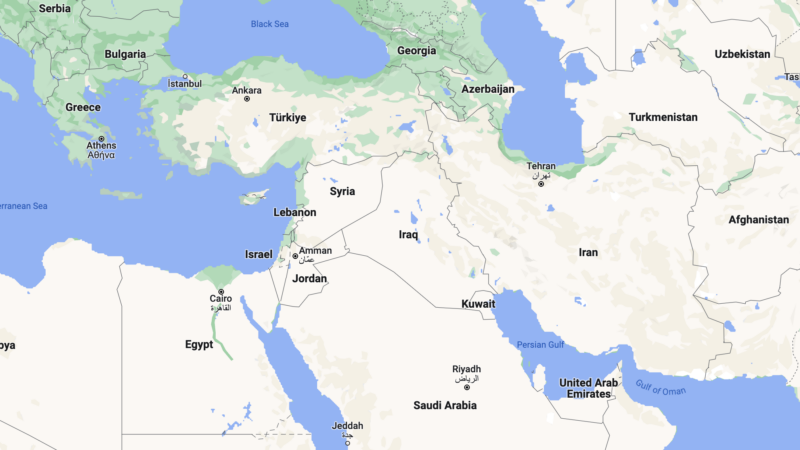
Screenshot from Google Maps.
The last time Azerbaijan and Iran were saber-rattling and exchanging hostile rhetoric was in November 2022. At the time, Azerbaijan's State Security Services (SSS) detained a group of 19 men allegedly trained to carry out blackmail and other violent acts in Azerbaijani territory. The State Security Services claimed the group was controlled by the Iranian Special Services and was armed. Iran authorities then accused an Azerbaijani man of orchestrating the attack on Shah Cheragh Shrine, which killed 15 and injured 40. This time tensions have been simmering since January 2023, when a gunman stormed the Azerbaijani embassy in Tehran, Iran's capital. The gunman killed the security chief and wounded two guards in the embassy. Azerbaijan Foreign Ministry evacuated the staff and their families following the attack. Since then, tensions have been on the rise. In the latest escalation, Azerbaijan expelled four of Iran's diplomats on April 6 after declaring them persona-non-grata.
Earlier, on March 28, Azerbaijani MP Fazil Mustafa was shot outside of his home. The MP, who survived the attack with wounds to his shoulder and thigh, is known for his criticism of Iran. The lawmaker has reportedly called Iran a “terrorist state.” On March 27, Azerbaijan State Security Service said in a broadcast by public television that it was anticipating an assassination of a well-known public figure.
Two days after the attack on Mustafa, mutual accusations were leveled when Azerbaijan's Foreign Minister Jeyhun Bayramov flew to Israel for the opening of Azerbaijan's embassy in Jerusalem. Iran and Israel have a long-running conflict, and therefore the move, some Azerbaijani MPs connected the timing of the attack on the MP to the opening of the embassy, concluding that Tehran was the culprit. The Press Secretary of the Azerbaijan Ministry of Foreign Affairs issued a separate statement saying the preliminary results of the investigation indicate Iran's involvement in the attack, according to Meydan TV reporting.
Iran issued harsh condemnations after the opening of the embassy. As such, first, Iran’s Foreign Ministry’s spokesperson, Nasir Kanani, said the opening of the embassy and the statements made by the Israeli Minister of Foreign Affairs, Eli Cohen, who said Israel and Azerbaijan “must act together against Iran” were “an implicit confirmation of the anti-Iranian orientation,” demanding an official explanation from Azerbaijan. Then, Kioumars Heydari, the commander of Iran’s ground forces, said Iran would not tolerate “Zionist elements” on its borders. Heydari went further, accusing Azerbaijan of deploying Syrian fighters in the Second Karabakh War in 2020. Azerbaijan's Ministry of Defense condemned Heydari's accusations.
On March 11, following Iran's military aircraft flight along the Azerbaijan-Iran state border, Azerbaijan's Foreign Ministry issued a joint statement with the Ministry of Defense condemning Iran for provocations, adding, “The flight of a military aircraft for more than half an hour near the liberated territories of Azerbaijan is a provocation and unfriendly behavior towards Azerbaijan.” The statement also referenced the military exercises Iran launched on October 17, 2022, on its border with Azerbaijan.
On April 6, six men were arrested for what the Azerbaijani state claimed were links to Iran's secret services — these were the latest arrests in what has been a wave of arrests since late January, with authorities labeling these individuals as “Iranian spies.” Citing unofficial information, Meydan TV reported on April 3 that some 400 believers were detained in total since an attack on the Embassy of Azerbaijan in Tehran over alleged links to Iran. Most were officially charged with drug possession.
Iran views Azerbaijan as Israel's proxy. Both countries share a military alliance, and Azerbaijan has received Israeli military and surveillance equipment.
Not your average neighbors
Iran and Azerbaijan are divided by a 700-kilometer border. Parts of this territory and the entry roads were long under Armenia's control following the first Karabakh war that ended with the 1994 ceasefire. In 2020, after the 44-day second Nagorno-Karabakh war between Armenia and Azerbaijan, Azerbaijan regained control over large swathes of this territory, including entry roads and land on the Iranian border. Azerbaijan also resented perceptions that Tehran backed Armenia during the 2020 war.
Despite this, the relations were somewhat normal until Azerbaijan decided in September 2021 to impose a road tax on Iranian trucks using roadways that are now under the control of Azerbaijan. When Armenia controlled those roads, vehicles could pass freely without having to pay any tax. There is also the issue of ethnic Azerbaijanis in northern Iran, who make up the largest non-Persian minority in Iran.
During the war between Armenia and Azerbaijan in 2020, ethnic Azerbaijanis organized protests in support of the war in several cities in Iran. The latter has long accused its neighbor “of stirring up resentment among Iran’s Turkic-speaking Azeri population. Since the summer of 2022, pro-government newspapers in Azerbaijan have been more vocal about calls for succession and Azerbaijan stepping up its support for a “national-liberation movement” in Southern Azerbaijan (or northern Iran).
However, questions loom over whether Fazil Mustafa was indeed shot by pro-Iran spies and even if he was shot at all. Some political activists alluded that mass arrests and detentions of believers were not necessarily linked to what the state has described as a “resistance squad aimed at establishing a Shari'a state in Azerbaijan,” but instead an attempt to threaten and send a message to Iran. The drug charges handed to most of the arrested are also laughable, said one of the family members of the arrested believer, “First of all, if so many citizens of one state are spies of another state, as they say, then this is a shame for that state. Second, how is it possible that so many religious drug addicts became drug dealers? It cannot get more ridiculous than this?!”
According to this story in Tehran Times, the message may not have been well received. Baku should be learning lessons from the war in Ukraine, where Western support for its allies has been forsaken, read the article by Sadegh Fereydounabadi on April 9.
Prospects for another regional war
But whether these escalations could lead to an actual state of war is unlikely, according to Vali Kaleji, a Tehran-based Caucasia and Central Asia analyst. In an interview with AlJazeera, Kaleji said, “Although recent tensions are very serious, there are many factors that prevent military conflict, including economic and trade interdependence, transit routes between Iran, Azerbaijan, and Russia, and also Azerbaijan’s dependence on Iran’s communication route to reach Nakhchivan.” Nakhchivan is Azerbaijan’s remote enclave sandwiched between Armenia, Turkey, and Iran.
According to Mohammad Ayatollahi Tabaar, what may constitute a military operation is if Iran chooses “to conduct missile and drone attacks on what the Iranian government claims are Israeli bases in Azerbaijan, similar to operations it launched in recent months against Israeli “strategic centers” in the Kurdish-dominated regions of Iraq. (Iraqi Kurdish officials have denied the claim that such bases exist.) Then, Azerbaijan and Israel—perhaps with the cooperation of Turkey—might seek to foment an insurgency among ethnic Azeris in Iran, which could, in turn, provoke the Iranian military to venture into Azerbaijan itself.”
On April 8, the Foreign Ministers of Azerbaijan and Iran spoke on the phone over recent tensions. In separate readouts of the conversation by the ministries, the two discussed the misunderstandings and noted the importance of continuing negotiations. Speaking to Turan News Agency, Azerbaijan's former Foreign Minister Tofig Zulfugarov said the phone conversation on April 8 was a positive sign. The ex-Minister blamed the representatives of the IRGC (Islamic Revolutionary Guards Corps) and the supreme spiritual leader of Iran for stirring up tensions, while Iran's Foreign Ministry and political elite at large were not interested in these escalations. “There is an understanding that further growth of tension does not bode well for either Iran or Azerbaijan,” said Zulfugarov. Meanwhile, according to Turan News Agency reporting, another religious activist was detained on April 10.






